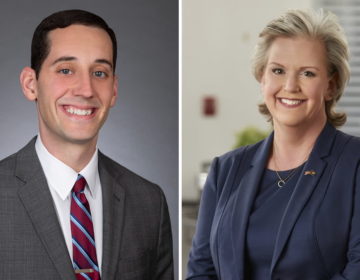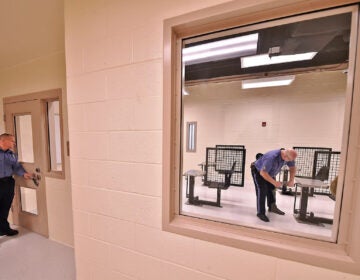$1.5 million from feds will help Delaware assist inmates re-entering community
Delaware will use $1.5 million in federal grant money to help inmates reintegrate into society in hopes of reducing the number of inmates who return to prison.

Delaware Gov. John Carney Tuesday announces efforts to reduce recidivism at the Department of Correction administration building in Dover. (Mark Eichmann/WHYY)
For years, Delaware prisons have struggled with too few guards available to watch too many inmates. Part of the problem is the state’s high rate of inmates returning to prison.
Now, the state is renewing its focus on helping inmates avoid a return trip behind bars with the help of some federal grant money.
Statistics point to a serious revolving door at Delaware’s prisons with 76 percent of inmates being sent back to prison within three years of release. That’s more than 4,500 out of the 6,000 inmates released every year.
The state must do a better job of preparing inmates for life beyond prison walls, especially because 90 percent of inmates will eventually be released, said Gov. John Carney.
“They’ll be standing next to us in line at the Wawa or at the mall, they’ll be living in our communities, so it’s in all of our interests to make sure that they’re better prepared to be successful when they leave the Department of Corrections,” Carney said. “We have an obligation to make sure that Delaware offenders who have served out their sentences have a real opportunity to re-enter their communities successfully.”
The state will use two federal grants totaling $1.5 million to help inmates resume civilian life. That money will help create a transition plan for every inmate and provide financial assistance upon their release to help them get on their feet.
The money will also add more job training in construction at the state’s Plummer Community Corrections Center in Wilmington through a partnership with Delaware Technical Community College. The Wilmington center is for inmates in work release as they prepare to transition from full-time lockup to freedom. The program will help inmates learn the construction trade — and it will offer potential employment opportunities with 2Fish Home Construction, which has already been hiring former inmates.
Adam Balick, the executive director of the Delaware Criminal Justice Council, said the money will also help inmates and those recently released obtain cognitive behavioral therapy.
“Many of these folks come out of prison, not just with mental health, medical [problems], and substance abuse issues, but they don’t have access to mental health treatment, substance abuse treatment and medical treatment,” he said. “We can address that.”
Balick said cognitive behavioral therapy will be offered for inmates at Morris Community Correctional Facility in Dover. Therapy will also be offered to inmates who are on probation following their release.
The funding will also help create transition plans for every inmate as a guide through the release process.
Inmates often face further punishment and stumbling blocks to their re-entry into society including difficulty in finding employment.
“In Delaware, there’s over 700 collateral consequences as a result of a person being convicted of a crime … This project helps us knock some of those barriers down and help some of our justice-involved individuals get back into the community and become law-abiding, tax-paying citizens,” said Department of Correction Commissioner Perry Phelps.
The University of Delaware’s Center for Drug and Health Studies will help evaluate the effectiveness of these measures and will determine what works and what doesn’t to reduce recidivism.
WHYY is your source for fact-based, in-depth journalism and information. As a nonprofit organization, we rely on financial support from readers like you. Please give today.





